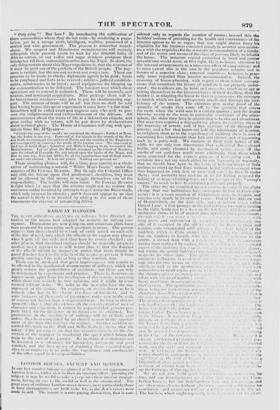RAILWAY DANGERS.
THE resent calamitous accidents en railways have directed at- tention to the means best adapted for security by railway con- veyance. Discussions are now going on, and numerous plans have been proposed fiw preventing such accidents in tut are. One person suggests that there should be a bank of' earth raised on each side of' the line of road, into which the wheels of the engine may plunge when it gets off the rails, and thus have its course checked ; an- other phut is, that six-wheel engines should be generally adopted; another, and it appears to its still better plan is, that the flanches of tie wheels should be deeper; or rather, that there should be guard- fianches tined to the wheels of the engine to prevent it froun possibly running ,:fl'the rails so long as they continue firm. There eau be no doubt that great improvcintses still remain to be effected in the mechanical arrangements of railways, which will greatly reduce the probabilities of accidents ; but these can only be deterndned by experiment and practice. There is, however, an improvement. apart flout the m«.hanisin of the system, respecting which there ran searecly be two opinions, and it might be com- menced withent dehty. We refer to the men who have the ma- nagement of the trains. An crgineer, or enoine-driver as he is termed, who has iii lii i !levee the lives of hundreds, and in some instences or thousands or passengers, ranks now in the scale of society not higher than a stege-coachman. So long as this re- sponsible office is thus placed betteath the cot:sides:ohms of men of character tind education. it citunot be expected that persons pro- perly liocd for the disc1see7 or its ditties tem be obtained. lin- Proventents in the nee him sy or railways imihl he of little avail unless tht•y be accomeanied by an altered system in the nppoint- ment or the men who conduct the engines. Another accident re- corded this week on the Dull :Ind Selby Rill's ay, shows that the safety I' the pievsengers en that line depeed, entirely on the dis- cretion or he enginetT 111 regulating the speed which brings the train to the end of its jouritey. No tneelmnical contrivance Olin be invented as a substitttle for ktiowltabw, jthbmit at, and good conduct, and the lust or obtainiiug thosc vsscotha requi- sites in an engineer, is to make the importance and emoluments of the office t.pialIii it,-;


























 Previous page
Previous page